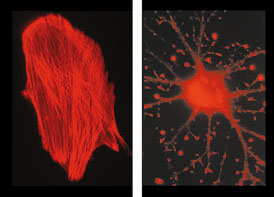
"Shoot the messenger" is apparently the name of the game in the body's protein regulation system. Researchers at the Weizmann Institute of Science have discovered that the synthesis and regulation of actin, the most abundant protein in human cells, is based on destroying its messenger RNA (mRNA). The messenger carries genetic information from the cell nucleus to actin-producing protein factories.
Actin serves as the central building block of the cytoskeletal fiber system that influences cell shape, division, adhesion, and motility. In turn, these cellular functions control important biological processes, including embryonic development and wound healing. To perform these functions, actin levels need to be balanced with clockwork precision. Indeed, faulty actin regulation can have wide-ranging, often devastating effects, including the onset of cancer and blood diseases.
Prof. Avri Ben-Ze'ev, along with Prof. Alexander Bershadsky and doctoral student Anna Lyubimova of the Weizmann Institute's Molecular Cell Biology Department, has recently zeroed in on one of the mechanisms regulating actin synthesis. Actin exists in the cell in two states: monomeric (or single unit) and polymeric (a chain of monomeric units). The researchers had previously found that a fine balance between these two forms regulates actin synthesis. When in excess, the monomeric actin destroys the mRNA machinery necessary for its own production.
Yet, how does actin actually regulate its own levels? Prof. Ben-Ze'ev and his team were able to pinpoint the precise region in the actin gene, which, when deleted, prevents the regulatory system from kicking in. They found that this regulation depends on a binding site activated when excess mRNA overflows into "unacceptable" parts of the cell. Deleting this region led to a dramatic increase in monomeric actin levels, coupled with severe aberrations in cell morphology.
Recently published in the Journal of Cellular Biochemistry, the Weizmann team's discovery of a direct link between regulating the genetic expression of actin mRNA and specific changes in cytoskeletal dynamics represents an important step forward in understanding the interplay between cell shape, structure, and gene expression.
Prof. Avri Ben-Zeev holds the Samuel Lunenfeld-Reuben Kunin Chair of Genetics.
